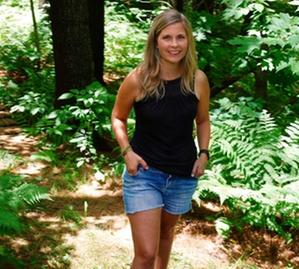 |
|
| (photo: Peter Carini) | |
Jo Knowles is the Vermont-dwelling, award-winning author of Still a Work in Progress, See You at Harry's, Living with Jackie Chan and Jumping Off Swings, among others. She is treasured by young readers for her intensely emotional, immensely real young-adult and middle-grade novels. Knowles recently spoke with Shelf Awareness about sexual identity and the many surprising details of her own childhood that can be found in her latest middle-grade novel, Where the Heart Is (Candlewick, April 2, 2019).
You wrote that many of the details in Where the Heart Is were drawn from your own childhood. Was it difficult to fictionalize some of these real events?
In some ways yes, and others no. The fun parts were a joy to write. I have such fond memories of my childhood home, playing with my siblings and neighbors, my old pony and other pets. But the harder parts were more of a challenge--revisiting how it felt to be afraid and uncertain both personally and financially, and to say goodbye to my beloved home, brought back a lot of sad memories. And, yet, the process of writing through these memories helped me accept what happened, and let go of some lingering hard feelings.
You gracefully weave together a number of themes in Where the Heart Is: friendship, identity, sexual orientation, gender roles, relationships, financial struggles, home. Is this the story you set out to write, or did it evolve as you went along?
Thank you! For a few years now, a dear friend has been after me to write more about my childhood, and in particular about the animals I took care of when I was 13. In my own life, our home wasn't foreclosed on until I was college-age. I blended a lot of things from my life into one summer, which was definitely a challenge. I don't think I really intended it that way before I started writing. But the minute I sat down and wrote those first words about Rachel and Micah, and how their friendship began, I knew I was going to explore identity and friendship. All the rest came out pretty naturally as the story progressed.
It's the emotions that power the book's plot. Rachel feels, in turns, desperate, lonely, joyous, helpless, guilty, embarrassed, anxious.... Does this part of your writing come naturally, or are you deliberate in incorporating so much emotion into your characters and stories?
It's funny you should say this. My first young reader just wrote a review saying, "I would feel emotions, as if I was a part of the story." I'm guessing this is going to be my favorite response! What more could an author wish for than to inspire empathy in her readers? I think because I was so emotional as I wrote this book, it naturally carried over into the telling of it. I remember so clearly having those same powerful emotions: confusion, helplessness, worry. They were all just seeping out of me as I relived it. When I wrote the chapter about Rainbow, I just started sobbing, remembering those feelings of despair, guilt and fear.
Rachel doesn't know for sure where she is in terms of her sexual orientation. Why did you choose to write about a character who is on the cusp but has not yet identified her sexual orientation?
When my son was in middle school, there were a fair number of kids he knew who had similar questions. The two of us talked about what that must be like and how to support friends. When I first started thinking about writing the book, I asked him how he felt about me writing about a kid who was in the questioning stage, and he encouraged me to do it--he felt like there were a lot of kids who really don't know how they identify yet, or aren't ready to decide, and that should be okay. We talked about these challenges as I wrote the book. I was worried I was drawing too much from my own experience, but he reassured me that that's what would make it feel honest. Those were the best talks, honestly, and I hope the book will inspire readers to have similar discussions.
You've said that Robert Cormier was inspirational to you, both as reader and writer. Tell us more.
As a teen, his books spoke to me like no others. He was so honest! His characters were deeply flawed but also deeply passionate, and I loved that. I grew up watching my older brother be bullied mercilessly, not just by kids but by adults as well. The Chocolate War was the first YA book I read that showed the same. When I studied children's literature in graduate school, I was able to meet Cormier at a conference. He asked me what I wrote for my master's thesis and I told him my first YA novel. He quietly wrote his address in the back of the book he was signing for me, and told me to send it to him when I had revised it. I did, and he submitted it to his editor! We shared correspondence back and forth after that, but he passed away before I made my first sale. If not for his encouragement during that first crucial year out of college, I don't think I would have pursued this path. I owe him so much, and try to pay it forward by giving the same kind of encouragement to my own students.
Whose books would you like to have next to yours on a shelf?
I'm going to be 100% honest here and say that having books on any shelf is still quite magical. But my dream is to see my books next to my two beloved writing partners, Cindy Faughnan and Debbi Michiko Florence.
Is home where the heart is?
If home is the people we love, then yes. Wherever they go, so goes my heart. --Emilie Coulter

